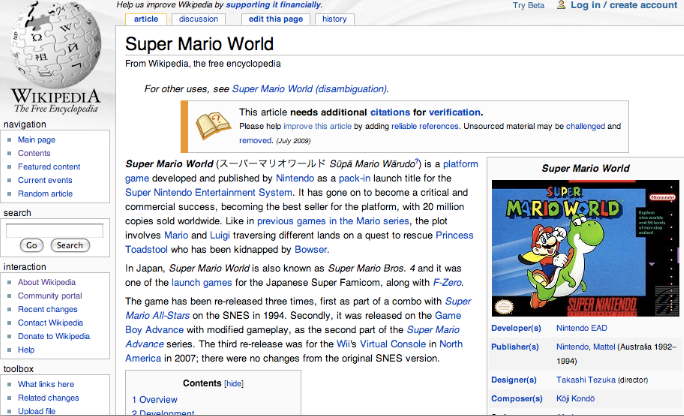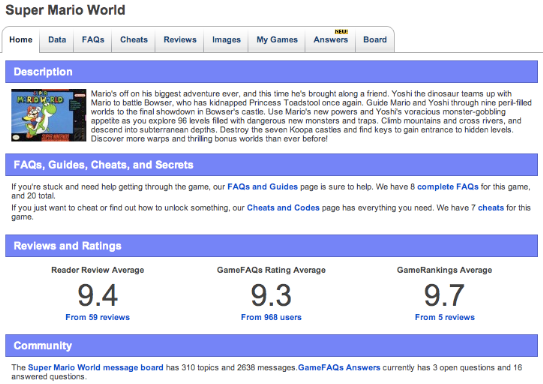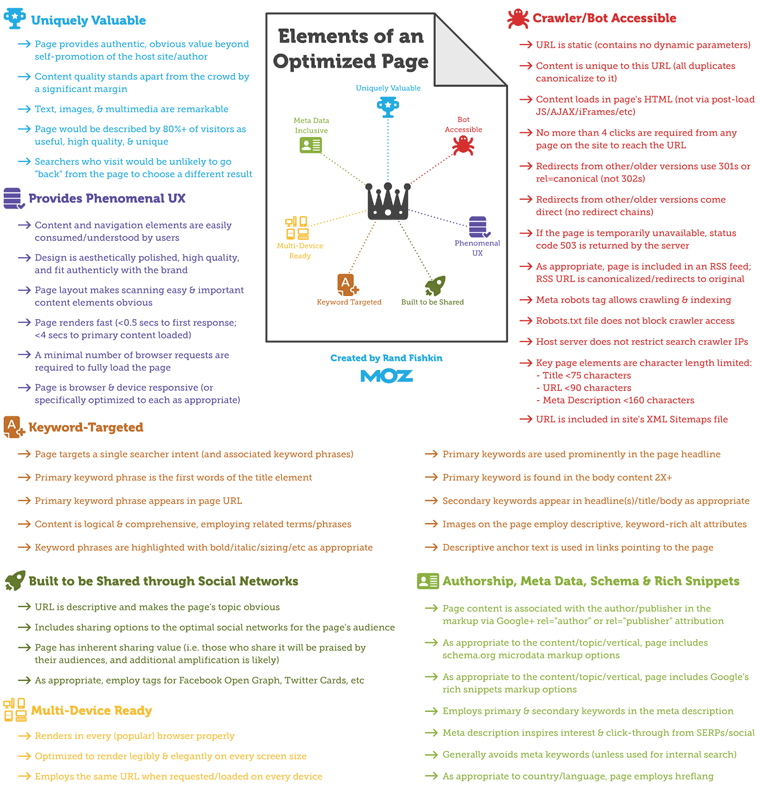On-Page Factors
On-Page factors are the aspects of a given web page that influence search engine ranking.
Code Sample
Content
<body>, <div>, <p>, <span>, no tag
Alt Text
<img src="http://www.example.com/example.png" alt="Keyword">
Bold/Strong
<b></b>
<strong></strong>What are On-Page Factors?
There are several on-page factors that affect search engine rankings. These include:
Content of Page
The content of a page is what makes it worthy of a search result position. It is what the user came to see and is thus extremely important to the search engines. As such, it is important to create good content. So what is good content? From an SEO perspective, all good content has two attributes. Good content must supply a demand and must be linkable.
Good content supplies a demand:
Just like the world’s markets, information is affected by supply and demand. The best content is that which does the best job of supplying the largest demand. It might take the form of an XKCD comic that is supplying nerd jokes to a large group of technologists or it might be a Wikipedia article that explains to the world the definition of Web 2.0. It can be a video, an image, a sound, or text, but it must supply a demand in order to be considered good content.
Good content is linkable:
From an SEO perspective, there is no difference between the best and worst content on the Internet if it is not linkable. If people can’t link to it, search engines will be very unlikely to rank it, and as a result the content won’t drive traffic to the given website. Unfortunately, this happens a lot more often than one might think. A few examples of this include: AJAX-powered image slide shows, content only accessible after logging in, and content that can't be reproduced or shared. Content that doesn't supply a demand or is not linkable is bad in the eyes of the search engines—and most likely some people, too.
Title Tag
Title tags are the second most important on-page factor for SEO, after content. You can read more information about title tags here.
URL
Along with smart internal linking, SEOs should make sure that the category hierarchy of the given website is reflected in URLs.
The following is a good example of URL structure:
- http://www.dmoz.org/Games/Video_Games/History/
This URL clearly shows the hierarchy of the information on the page (history as it pertains to video games in the context of games in general). This information is used to determine the relevancy of a given web page by the search engines. Due to the hierarchy, the engines can deduce that the page likely doesn’t pertain to history in general but rather to that of the history of video games. This makes it an ideal candidate for search results related to video game history. All of this information can be speculated on without even needing to process the content on the page.
The following is a bad example of URL structure:
- http://www.imdb.com/title/tt0468569/
Unlike the first example, this URL does not reflect the information hierarchy of the website. Search engines can see that the given page relates to titles (/title/) and is on the IMDB domain but cannot determine what the page is about. The reference to “tt0468569” does not directly infer anything that a web surfer is likely to search for. This means that the information provided by the URL is of very little value to search engines.
URL structure is important because it helps the search engines to understand relative importance and adds a helpful relevancy metric to the given page. It is also helpful from an anchor text perspective because people are more likely to link with the relevant word or phrase if the keywords are included in the URL.
SEO Best Practice
Content pages are the meat of websites and are almost always the reason visitors come to a site. Ideal content pages should be very specific to a given topic—usually a product or an object—and be hyper-relevant.
The purpose of the given web page should be directly stated in all of the following areas:
- Title tag
- URL
- Content of page
- Image alt text
Here is an example of a well-laid-out and search engine–friendly web page. All of its on-page factors are optimized.

The content page in this figure is considered good for several reasons. First, the content itself is unique on the Internet (which makes it worthwhile for search engines to rank well) and covers a specific bit of information in a lot of depth. If a searcher had question about Super Mario World, there is a good chance, that this page would answer their query.
Aside from content, this page is laid out well. The topic of the page is stated in the title tag (Super Mario World – Wikipedia, the free encyclopedia), URL (http://en.wikipedia.org/wiki/Super_Mario_World), the page's content (the page heading, "Super Mario World"), and within the alt text of every image on the page.
The following example is of a poorly optimized web page. Notice how it differs from the first example.

This figure shows a less search engine–friendly example of a content page targeting the term "Super Mario World." While the subject of the page is present in some of the important elements of the web page (title tag and images), the content is less robust than the Wikipedia example, and the relevant copy on the page is less helpful to a reader.
Notice that the description of the game is suspiciously similar to copy written by a marketing department. “Mario’s off on his biggest adventure ever, and this time he has brought a friend.” That is not the language that searchers write queries in, and it is not the type of message that is likely to answer a searcher's query. Compare this to the first sentence of the Wikipedia example: “Super Mario World is a platform game developed and published by Nintendo as a pack–in launch title for the Super Nintendo Entertainment System.”. In the poorly optimized example, all that is established by the first sentence is that someone or something called Mario is on an adventure that is bigger than his or her previous adventure (how do you quantify that?) and he or she is accompanied by an unnamed friend.
The Wikipedia example tells the reader that Super Mario World is a game developed and published by Nintendo for the gaming system Super Nintendo Entertainment System–the other example does not. Search results in both Bing and Google show the better optimized page ranking higher.
An Ideally Optimized Web Page
An ideal web page should do all of the following:
- Be hyper-relevant to a specific topic (usually a product or single object)
- Include subject in title tag
- Include subject in URL
- Include subject in image alt text
- Specify subject several times throughout text content
- Provide unique content about a given subject
- Link back to its category page
- Link back to its subcategory page (If applicable)
- Link back to its homepage (normally accomplished with an image link showing the website logo on the top left of a page)
Related Tools
MozBar
The MozBar SEO toolbar lets you see relevant metrics in your browser as you surf the web.
The MozBar SEO toolbar lets you see relevant metrics in your browser as you surf the web.
Open Site Explorer
Open Site Explorer is a free tool that gives webmasters the ability to analyze up to 10,000 links to any site or page on the web via the Mozscape web index.
Open Site Explorer is a free tool that gives webmasters the ability to analyze up to 10,000 links to any site or page on the web via the Mozscape web index.
Term Target
Helps determine how targeted a particular page is for a specified keyword by analyzing a variety of factors.
Helps determine how targeted a particular page is for a specified keyword by analyzing a variety of factors.
External Resources
SEO Advice: Writing useful articles that readers will love
Matt Cutts, head of Google's Webspam team shares his thoughts on good content.
Matt Cutts, head of Google's Webspam team shares his thoughts on good content.
Google-friendly sites
Google's official documentation on building Google-friendly websites.
Google's official documentation on building Google-friendly websites.
Related Guides
The Beginner's Guide to SEO
Moz’s comprehensive guide to the practice of search engine optimization for those unfamiliar with the subject.
Moz’s comprehensive guide to the practice of search engine optimization for those unfamiliar with the subject.




